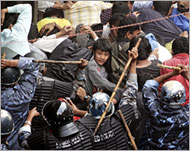Nepal curfews fail to deter protesters
King Gyanendra has slapped a fresh curfew on the capital as the opposition vowed to keep up the pressure to end his control over Nepal.

The streets of Kathmandu were quiet early on Sunday after state television announced the latest 11-hour curfew and mobile phone services remained cut.
But an alliance of seven opposition parties said there would be more mass demonstrations like the one on Saturday where 300,000 people marched to the heavily-guarded city centre and near Gyanendra’s pink-tinged palace.
“There is no way we can join the government and our general strike and peaceful protest will continue,” the parties said in a statement, snubbing the king’s offer to let the alliance select a prime minister.
King’s offer rejected
In a televised address late on Friday, Gyanendra also promised to return power to the people after two weeks of daily marches against his absolute rule.
|
|
|
The opposition says its general |
His conciliatory speech earned a qualified welcome from the international community, which called it a step in the right direction, but was flatly rejected by Nepal‘s opposition.
The opposition parties say the king must recall parliament, which he suspended in 2002, and agree to a constituent assembly to review the constitution, including the role of the monarchy that now has control of the armed forces.
A heavier than usual contingent of soldiers were posted every few hundred metres around the royal palace on Sunday.
The streets were virtually deserted save for a small group of bemused tourists.
Speech
An editorial in the state-run newspaper, the Rising Nepal, warned on Sunday of a “historic blunder” if the opposition parties failed to accept the king’s offer.
“Should the political parties fail to listen to the grievances of the people and let anarchy and chaos prevail in the country again, it will compound the problems,” it said.
But The Himalayan newspaper, traditionally neutral, said in a front-page opinion piece that the king had “bungled” an opportunity to make amends in his Friday televised address.
|
“To be or not to be a republic – let the sovereign people of Nepal decide for themselves” The Himalayan newspaper |
In his speech, Gyanendra called for “a meaningful exercise in democracy” with elections “as soon as possible” but gave no ground to the Maoists, who have fought a 10-year insurgency that has left some 12,500 dead.
“None can believe how a monarch of his background and intelligence got persuaded to the point that he still could get away with what he did,” the article said.
“To be or not to be a republic – let the sovereign people of Nepal decide for themselves.”
More than 100 people were injured in clashes with police on Saturday as protesters registered their fury against Gyanendra.
They defied the eight-hour curfew and marched on central areas of the capital, demanding “complete democracy”.
Police charged at them with batons and tear gas.
The crisis was sparked by Gyanendra’s decision to sack the government on February 1 last year, saying it was corrupt and had failed to stem the Maoist revolt.
